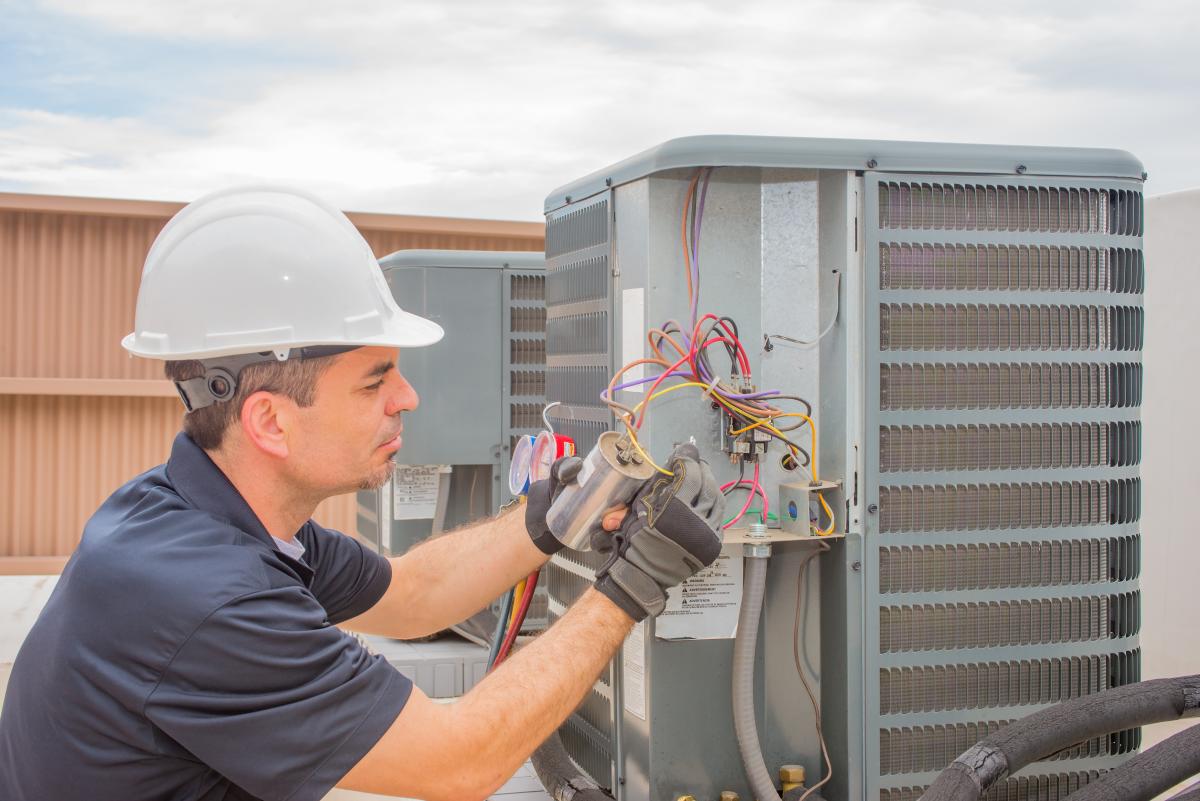HVAC Licensing Requirements: A State By State Guide

HVAC (heating, ventilation, and air conditioning) techs install, repair, and maintain ventilation, heating, and cooling equipment in residential and commercial buildings. According to an industry analysis report by Grand View Research, the demand for HVAC equipment in North America is expected to grow at least 6.1% between 2020 and 2027. Most states require HVAC contractors to hold a license. Licensing requirements differ from state to state, but most professional HVAC techs begin with an EPA 608 certification. Sometimes, HVAC contractors also need to gain plumbing certifications to modify or install pipework. Occasionally, states have city or county-specific certification rules rather than statewide licensing requirements. In this comprehensive guide, we'll focus on the licenses needed to work on residential HVAC projects in all 50 states as well as the District of Columbia.
EPA 608 Certification
All HVAC techs in America who work with refrigerant must be certified under Section 608 of the Clean Air Act, regardless of their state. An Environmental Protection Agency (EPA) requirement, the Refrigerant Handling (EPA 608) certification course educates participants about safe refrigerant handling. When they're not handled safely, ozone-depleting refrigerants can harm the environment. There are four types of 608 technician certification:
Type I: Small HVAC appliance servicing — Course topics include refrigerant identification, refrigerant recovery techniques, and access valve installation;
Type II: High-pressure HVAC appliance servicing or disposal, except small appliances and motor vehicle air-conditioning units (MVACs) — Course topics include refrigerant leakage detection, leak repair record keeping, and various evacuation requirements for high-pressure appliances;
Type III: Low-pressure HVAC appliance servicing and disposal — Course topics include low-pressure leak detection, allowable annual leak rate, and recharging techniques; and
Universal: Small, high-pressure, and low-pressure HVAC appliance servicing and disposal — Course topics include refrigerant environmental impacts, the Montreal Protocol, and EPA Section 608 regulations
NATE Certification
America's largest organization for heating, ventilation, air conditioning, and refrigeration (HVACR) technicians, North American Technician Excellence (NATE) offers a multistep certification program for HVAC techs. Savvy homeowners and employers often prefer NATE-certified contractors, making NATE certification a sensible option for most HVAC professionals. There are four different NATE-certification levels:
Ready-to-work: An entry-level qualification for brand new HVACR technicians with little or no formal training;
HVAC support: A follow-up certification for techs who've worked in the HVAC sector for six to 12 months, this course prepares candidates for NATE professional-level exams;
Core and specialty tests: Techs who've worked in the HVAC field for two-plus years can earn specialized certifications; and
Senior-level efficiency analyst: Technicians with two or more NATE service certifications can take the senior level efficiency analyst exam. This is the highest certification level offered by NATE.
NATE offers an additional all-in-one qualification for HVAC professionals, known as a CHP-5 certification. This option blends traditional coursework with on-the-job experience. To gain the CHP-5 certification, individuals must pass five 30-question exams based on HVAC fundamentals, electrical and controls, comfort and airflow, installation, and service.
HVAC Licensing Requirements by State
In addition to EPA 608 certification, most of the country requires HVAC technicians to be licensed. Thirty-eight states (plus the District of Columbia) offer licensing at the state level. While the remaining twelve don't offer a state-wide licensing program, HVAC technicians may still need to obtain a license at the county, municipality, or city level. To learn more about HVAC licensing requirements in your state, select your state or scroll to find it below

Alabama HVAC License Requirements
HVAC technicians need a license to perform air conditioning, heating, and refrigeration services on Alabama's residential and commercial properties. HVAC techs need to go through the Alabama Board of Heating, Air Conditioning & Refrigeration Contractors to get a heating and air conditioning certification. HVAC contractors must:
Have graduated from an approved HVAC certification program, or
Have held an apprenticeship certificate for two years, or
Have worked at least 3,000 hours (approx. 18 months) under the guidance of a licensed professional; and
Pay a $150 fee and apply for an active certification examination, which includes a $15,000 performance bond.
All HVAC professionals in Alabama must complete four hours of continuing education before renewing their licenses by December 31st every year.

Alaska HVAC License Requirements
To work as an HVAC tech in Alaska, contractors must first hold a mechanical administrator license or employ a mechanical administrator. To get a certification, contractors need to contact the Division of Corporations, Business and Professional Licensing. Several different types of licenses exist, including:
Residential HVAC (RHVC),
Unlimited Refrigeration (UR),
Heating, Cooling, and Process Piping (HCPP), and
Unlimited HVAC/Sheet Metal (UHVCS).
HVAC contractors must:
Have journeyman experience in two out of the last four years to obtain an RHVC or UR license;
Have journeyman experience in four out of the last six years to get an HCPP or UHVCS license;
Produce proof of graduation from an accredited course if they don't have journeyman experience;
Pay a $125 fee and pass a multiple-choice examination;
Pay $250 for the specific HVAC license if they pass the exam; and
Register as a mechanical contractor, which costs $50 and includes a $10,000 surety bond.
All HVAC contractors must complete eight hours of continuing education annually to renew their licenses.

Arizona HVAC License Requirements
You don't need a license to do business as a newly qualified HVAC technician in Arizona. However, contractors who want to achieve journeyman status have to get a license from the Arizona Registrar of Contractors (ARC). The ARC issues separate licenses for residential and commercial work or dual licenses that cover residential and commercial contracting. A Residential HVAC license, which falls under the Specialty Residential Contracting category, is known as R-39 Air Conditioning and Refrigeration, including Solar. R-39 license categories include:
R-39R: Warm Air Heating, Evaporative Cooling, and Ventilating
R-39R: Evaporative Cooling and Ventilators
R-39R: Air Conditioning and Refrigeration
R-39R: Temperature Control Systems
HVAC contractors must:
Have four years’ experience in the HVAC specialty they're applying for a license in, or
Have two years’ experience in the aforementioned field plus graduation from a specialist course or apprenticeship;
Pay a $66 fee and pass the Arizona trade and business management exam;
Register with the Arizona Secretary of State or the Arizona Corporation Commission; and
Show proof of workers' comp insurance if they employ anyone else.
Arizona HVAC professionals also need to file a contractor's bond between $4,250 and $7,500, depending on gross work volume. Additionally, they'll have to post a $200,000 cash or surety bond or pay an assessment fee to the Registrar's Residential Recovery Fund.

Arkansas HVAC License Requirements
You can work as an HVAC technician in Arkansas without getting a license, though you'll still need to register with the Arkansas Department of Health. On the other hand, Arkansas HVAC contractors must apply for their licenses from the Arkansas Department of Health's HVACR Licensing Board. The HVACR board partners with Prov, a licensing and examination services provider, and applicants must be preapproved by the board to sit for the HVAC contractor exam. HVAC contractors must:
Be at least 18 years of age;
Graduate from a recognized HVACR program, or
Have two years of experience and on-the-job training as an HVACR tech;
Renew their licenses every year; and
Maintain a surety or cash bond of at least $10,000.
There are six HVAC license types in Arkansas:
A: HVACR work without limitation on BTUH or horsepower
B: HVACR work on AC systems with a maximum 15-ton cooling capacity/1 million BTUH heating input per unit, or refrigeration systems with 15 horsepower or less per unit
C: Service or repair of the same type of unit as a class B license — N.B. Class C license holders can't install or replace AC units.
D: Work with sheet metal and install ductwork for HVAC projects
E: Perform refrigeration work without horsepower limitations
L: A lifetime version of the class B license

California HVAC License Requirements
Before working on any HVAC job over $500 in California, you need to get a C-20 Warm-Air Heating, Ventilating, and Air-Conditioning Contractor license. To do so, you must contact the Department of Consumer Affairs Contractors State License Board. You'll need preapproval from the CSLB before sitting for the C-20 examination. You don't need to complete any formal training to become an HVAC tech in California, but you need substantial HVAC experience. HVAC contractors must:
Be at least 18 years of age;
Have four years of verifiable HVAC experience within the last 10 years;
Pass a trade exam and a business law exam;
Have proof of workers' comp if they have employees; and
Maintain a $15,000 surety bond.

Colorado HVAC License Requirements
Contractors who plan to work as HVAC techs don't need a state license in Colorado. However, individual counties and cities may have HVAC licensing requirements. Many HVAC techs obtain other types of licenses, including residential, journeyman, and master electrician or plumbing licenses. In addition to holding an EPA 608 technician certificate, here are a few of the cities where HVAC contractors are required to have additional certification.
Denver: Get a Denver heating, ventilating, and AC license for residential HVAC work;
Littleton: Get a D-11 HVAC license to perform residential HVAC work;
Englewood: Obtain ICC certification and get an E-1 HVAC license;
Fort Collins: Obtain a Specialized Trade Contractor license for residential HVAC work.

Connecticut HVAC License Requirements
Three different types of HVAC licenses exist in Connecticut: apprentice, journeyman, and contractor. In addition, there are several different types of license you can apply for, including:
D-1/D-2: Limited Warm Air, Air Conditioning, and Refrigeration Contractor/Journeyman
D-3/D-4: Limited Cooling Contractor/Journeyman
G-1/G-2: Limited Heating, Piping, and Cooling Contractor/Journeyman
S-1/S-2: Unlimited Heating, Piping, and Cooling Contractor/Journeyman
S-3/S-4: Limited Heating, Cooling, and Piping Contractor/Journeyman
S-9/S-10: Limited Heating, Cooling Contractor/Journeyman
To move up through the ranks of an HVAC professional, you must:
Obtain an S-2 qualification before enrolling in an HVAC apprenticeship;
Register with the Connecticut Office of Apprenticeship Training, and get a permit from the Connecticut DCP;
Complete a registered four-year apprenticeship, including 8,000 hours of on-site training;
Pay a $90.00 fee, pass the journeyman exam, and pay $120 for a limited or unlimited journeyman HVAC license;
Work as an HVAC journeyman for at least two years before paying a $150 application fee for an HVAC contractor's license; and
Pay $150 for the HVAC contractor's license.
Journeymen and HVAC contractors in Connecticut must renew their license before August 31st every year.

Delaware HVAC License Requirements
To get started in the HVAC sector in Delaware, contractors must obtain one of two different types of licenses: a Master HVACR or a Master HVACR Restricted license. Individuals who hold the restricted license specialize in one of the following:
Air conditioning;
Forced air heating systems, gas piping, and ventilation;
Hydronic heating systems and gas piping;
Refrigeration;
Commercial hood systems; or
Gas piping.
Individuals who hold the unrestricted Master HVACR license can provide services in all of the above specialties. HVAC contractors must:
Obtain a Master Plumber license if they intend to do any plumbing;
Complete an HVAC apprenticeship or take the Apprenticeship By-Pass Exam;
Complete two years of supervised work experience as a registered HVAC journeyman;
Complete seven years of supervised work experience if they don't have an HVAC journeyman certificate;
Create an account at Delaware Professional Regulation Online Services (DELPROS), where they'll also submit their applications and license fees; and
Pass the HVAC Master contractor exam.

District of Columbia HVAC License Requirements
HVAC techs have to obtain a license from the District of Columbia Board of Industrial Trades before beginning work in the District of Columbia. Several different HVAC licensing options exist, including Refrigeration and Air Conditioning Contractor, Master Refrigeration and Air Conditioning Mechanic, and Master Refrigeration and Air Conditioning Mechanic Limited. HVAC contractors must:
Complete a four-year/8,000-hour HVAC apprenticeship to apply for HVAC Journeyman via the waiver route, or
Pay a $260 application and license fee and pass an HVAC Journeyman exam after three years' HVAC work experience; and
Pay a $260 application and license fee and pass an HVAC Master exam after four or five years of HVAC Journeyman work experience.
HVAC licenses in the District of Columbia must be renewed every two years.

Florida HVAC License Requirements
To work as an HVAC contractor in Florida, you have to get a license from the state's Department of Business and Professional Regulation. Three different statewide HVAC licenses exist:
Class A certified air-conditioning contractor: Contractors can install, repair, and maintain any-sized heating and cooling system anywhere in Florida
Class B certified air-conditioning contractor: Contractors can install, repair, and maintain heating systems under 500,000 BTUs and cooling systems with a cooling capacity below 25 tons anywhere in Florida
Registered air-conditioning contractor (Class A or B): Essentially a local (not statewide) version of either of the above certifications
HVAC contractors must:
Have four years of on-the-job experience and education;
Pay a license application fee of up to $249, and pass a background check;
Pass the Florida state licensing exam;
Maintain a credit score over 660; and
Set up any applicable HVAC insurance.

Georgia HVAC License Requirements
Georgia HVAC techs have to get a license from the State Construction Industry Licensing Board Division of Conditioned Air Contractors before working on residential and commercial HVAC projects. Two types of HVAC license exist:
Class I HVAC license: Restricted. Contractors are restricted to units with a maximum 175,000 BTU heating capacity and 60,000 BTU cooling capacity
Class II HVAC license: Unrestricted. Contractors can work on any type of HVAC unit
Have four (Class I) or five years (Class II) of relevant HVAC service and installation work experience;
Take a Georgia state-approved heat loss and gain and duct design course;
Pay a fee and pass the Class I or Class II licensing exam; and
Maintain a $10,000 surety bond.
Applicants for both Class I and Class II licenses who have an AAS degree in HVACR can take off two years of work experience. Applicants with a diploma or certificate in HVACR can subtract one year of work experience.

Hawaii HVAC License Requirements
In Hawaii, contractors who plan to work on projects worth over $1,000 have to get a license from the state's Contractor License Board. Numerous certification options exist, but most HVAC techs begin with a C-52 Ventilating and Air Conditioning Contractor license. If a technician or contractor plans to work outside the license scope, they will have to obtain additional plumbing, hot water, steam fitting, or electrical licensing. There is no licensing requirement in Hawaii for HVAC techs working entry-level jobs in the industry. However, low-level contractors working with refrigerants still need to obtain an EPA 608 certifications. HVAC contractors must:
Have four years of full-time HVAC supervisory experience in the last ten years;
Provide proof of business residency;
Show proof of workers' comp insurance if they plan to employ other people;
Maintain property and bodily injury liability insurances;
Pay a $50 application fee and pass a set of trade, law, and business-centric exams;
Pay up to $545 in contractor's fees; and
Renew their license every two years.

Idaho HVAC License Requirements
All HVAC technicians need a license from the Idaho Division of Building Safety before working in Idaho. This requirement applies to HVAC techs at any level, including apprentices and journeymen. Six license classes exist: Apprentice, Journeyman, Contractor, Specialty Apprentice, Specialty Journeyman, and Specialty Contractor. Specialty categories include hearth, waste oil, fuel gas piping, and LP gas limited heating. HVAC contractors must:
Work as an HVAC journeyman for at least 24 months to qualify for the HVAC Contractor exam;
Work in a specialty HVAC field for at least 24 months to qualify for the HVAC Specialty Contractor exam;
Pay a $100 Pearson VUE examination fee;
Pay a licensing fee between $35 and $50; and
Maintain a $2,000 compliance bond.
Licenses in Idaho are valid for a year, and license renewal fees cost between $75 and $110.

Illinois HVAC License Requirements
Entry-level and mid-level HVAC techs in Illinois aren't required to hold a license. Competition is fierce in the Illinois HVAC marketplace, so many HVAC professionals obtain NATE certifications to give themselves an edge. HVAC company owners must:
Ensure that they and their employees all gain EPA Section 608 certifications if they intend to work with refrigerants;
Get a General Contractor's License (Class A to E) if they plan to work in Chicago;
Obtain a Mechanical License (Class A to F) with the city's Mechanical Board before working in Rockford;
Get a Mechanical Contractor License from the city's Mechanical Board before working in Springfield;
Set up workers' comp insurance; and
Maintain any applicable bodily injury or property damage insurance in their jurisdiction.

Indiana HVAC License Requirements
In Indiana, each local authority determines its own HVAC licensing requirements. As they do in other states, all techs in Indiana must get an EPA Section 608 certification. Also, most HVAC contractors need a certification from the EPA, NATE, or the American Society of Heating, Refrigeration, and Air Conditioning Engineering (ASHRAE). If they plan to work in Indianapolis or in greater Marion County, HVAC techs need to obtain one of the following five licenses:
Unrestricted Air Conditioning License A
Air Conditioning License B: Techs can work on cooling units with a maximum 25-ton capacity and boilers with a maximum of 15 PSIG (pounds per square inch, gauge) of steam and 30 PSIG water capacity
Air Conditioning License D: Techs can work on cooling units with a maximum 5-ton capacity and heating units up to 300,000 BTUs
High-Pressure Steam License
Refrigeration License

Iowa HVAC License Requirements
To work as an HVAC tech at any level in Iowa, contractors need a license from the Iowa Plumbing and Mechanical Systems Board at the Iowa Department of Public Health. Apprentices, journeymen, and contractors all need to be certified. If they operate their own independent businesses, HVAC contractors also must get a contractor license and registration from the Division of Labor at Iowa Workforce Development. To gain a full HVAC Contractor License in Iowa, individuals over the age of 18 should:
Get an HVAC apprenticeship;
Pay a $99 examination fee, pass an exam, and apply for an HVAC Journeyman license after four years as an apprentice; and
Pay a $99 examination fee, pass another exam, and apply for an HVAC Master Level Technician license after two years spent as a journeyman.
Independent HVAC contractors must:
Hold an HVAC Master Level Technician license, or
Employ someone with an HVAC Master Level Technician license;
Maintain a permanent place of business; and
Provide proof of insurance and any applicable bond.

Kansas HVAC License Requirements
There isn't a statewide HVAC contractor licensing requirement in Kansas. Still, some municipalities — like Wichita, for example — have local-level licensing rules. Kansas does have specific HVAC mechanic licensing rules that cities have to adopt if they decide to create HVAC contractor licensing programs. To become journeymen, HVAC contractors must:
Complete two years of field experience, or
Complete one year of field experience and a 930-hour trade program; and
Pass an appropriate International Code Council (ICC), International Association of Plumbing and Mechanical Officials (IAPMO), or parametric exam.
Journeymen who want to obtain HVAC master licenses at the local level need to gain an additional two years of work experience. To maintain their licenses, HVAC contractors in Kansas need to complete at least 12 hours of continuing education per year.

Kentucky HVAC License Requirements
Kentucky requires all HVAC contractors to obtain a license from the state's Department of Housing, Buildings, and Construction (DHBC). Apprentices don't need a license to learn, but they need to be at least 18 years of age — and they have to register with the Division of HVAC at the DHBC. Before applying for a Journeyman HVAC Mechanic license, apprentices need to complete at least 3,000 hours of on-the-job training. Two limited journeyman mechanic qualifications exist in addition to the Journeyman HVAC Mechanic license:
Limited Journeyman HVAC Duct Mechanic
Limited Journeyman HVAC Installer Mechanic
To become a Master HVAC Contractor, you must:
Have held a Kentucky Journeyman HVAC Mechanic license for at least two years;
Have worked under the direct supervision of a Master HVAC Contractor for that period;
Pay a $60 fee and pass a 75-question exam;
Pay a $250 licensing fee; and
Buy general liability insurance of at least $500,000.
HVAC contractors must complete at least eight hours of continuing education each year to renew their licensing.

Louisiana HVAC License Requirements
In Louisiana, techs must obtain a license from the Louisiana State Licensing Board for Contractors before being eligible to work on HVAC projects. Rather than a specific HVAC license, Louisiana requires technicians to have a Commercial license, which covers residential projects worth over $50,000. Specialty licenses for niche HVAC projects are also available. HVAC contractors must:
Be at least 18 years of age;
Hold at least one form of valid U.S.-issued ID;
Show proof of financial solvency;
Get general liability insurance;
Submit to a background check; and
Score at least 70% on a 100-question HVAC license exam.
HVAC techs in Louisiana need to renew their licenses every year.

Maine HVAC License Requirements
There is no statewide HVAC licensing requirement in the state of Maine. Individual cities and counties in Maine sometimes have permitting requirements for HVAC projects, so contractors should check these before beginning work. Individuals looking for HVAC training options in Maine can choose one of two non-accredited courses at Southern Maine Community College or the Northeast Technical Institute. Maine doesn't currently offer any programs accredited by either HVAC Excellence or the Partnership for Air-Conditioning, Heating, Refrigeration Accreditation (PAHRA). In 2018, the Maine Energy Marketer's Association (MEMA) announced an accelerated vocational program for HVAC contractors. Offered at the MEMA Technical Education Center in Brunswick, this course teaches students how to deal with oil, electrical, propane, and natural gas heating systems as well as air conditioning and refrigeration. HVAC contractors in Maine must:
Have an EPA Section 608 certification if they plan to handle refrigerants; and
Check municipality rules about electrical and other permits before beginning work.

Maryland HVAC License Requirements
HVAC techs in Maryland need to gain a license from the Board of Heating, Ventilation, Air Conditioning, and Refrigeration Contractors at Maryland's Department of Labor, Licensing and Regulation before repairing, installing, or maintaining HVAC appliances. Three different types of HVAC contractor licenses exist: Master HVACR Contractor, Master Restricted HVACR Contractor, and Limited HVACR Contractor. Apprentices must complete 1,875 hours of HVAC training over three years before applying for Journeyman HVAC licenses. They also need to score 70% or more on their journeyman exams. Master or Master Restricted HVAC applicants must:
Have been licensed as a journeyman for three years under the supervision of a Master HVACR Contractor;
Worked more than 1,875 hours during the year immediately before filing an HVAC license application;
Score 70% or more on their Master or Master Restricted exam; and
Pay a licensing fee and maintain general liability insurance and property damage insurance.

Massachusetts HVAC License Requirements
Massachusetts doesn't have an HVAC tech licensing requirement, but contractors who work with refrigerants in the state need to obtain a license. People who plan to work with more than 10 tons of refrigerant (in the aggregate) have to get a Refrigeration Technician license from the state's Office of Public Safety and Inspections. Refrigeration Technician applicants must:
Complete between 100 and 1,000 hours of classroom theory at an accredited establishment;
Work between 2,000 and 6,000 hours as a Massachusetts Refrigeration Apprentice;
Obtain a Certificate of Completion of Apprenticeship from the Division of Apprentice Standards;
Properly complete an application and include a copy of their CFC certification;
Pay a $75 application processing fee; and
Pass a written exam.

Michigan HVAC License Requirements
Before installing, maintaining, or repairing residential HVAC equipment, techs in Michigan need to get a Mechanical Contractor license from the Mechanical Division of the Construction Codes Bureau at the Michigan Department of Licensing and Regulatory Affairs. Applicants need to have a minimum of three years' experience, whichever classification they apply. Classifications include:
Limited heating service;
Unlimited heating service;
Limited refrigeration and air conditioning services;
Unlimited refrigeration and air conditioning services;
Hydronic heating and cooling and process piping;
HVAC equipment;
Ductwork;
Refrigeration; and
Fire Suppression.
Michigan also offers five specialist Mechanical Contractor licensing categories: solar heating and cooling, LP distribution piping, fuel gas piping, fuel gas piping and venting, and solid fuel and vented decorative gas appliances. All Mechanical Contractor applicants must:
Have a minimum of three years of work experience in their chosen license classification(s); and
Pass an examination for their chosen license classification(s).

Minnesota HVAC License Requirements
HVAC technicians in Minnesota are classified as mechanical contractors. Mechanical contractors don't need a license to operate in the state. Still, they have to file with the Minnesota Department of Labor and Industry (DLI) and the Construction Codes and Licensing Division (CCLD). They also must post a $25,000 surety bond. Larger cities in Minnesota, including Minneapolis and St. Paul, have municipal certification rules. HVAC techs operating in the Twin Cities area need to obtain certificates of competency from the Safety and Inspections Department or the Minneapolis Construction Code Service. The following certificates are available:
Refrigeration: Refrigeration system installation and repair;
Gas fitter: Fuel burner and gas system installation and maintenance;
Steam and Hot Water: Piping and steam fitting installation and repair;
Ventilation: Air exchange system installation and repair;
Heating: Warm air exchange system installation and repair; and
Oil Burner: Oil burner system installation and repair.
HVAC contractors must:
Check local city or township licensing requirements; and
Ensure they adhere to the Minnesota State Building Code.

Mississippi HVAC License Requirements
In Mississippi, HVAC professionals need to get a residential HVAC license from the Mississippi State Board of Contractors before working on residential HVAC projects. You don't need a degree or special education to get an HVAC contractor license in Mississippi, but you need HVAC work experience. Formal HVAC training courses are available at the state's Career Development Center, Delta Technical College, and other vocational schools in Mississippi. HVAC contractors must:
Submit proof of financial responsibility;
Pay a $50 fee and pass an open-book trade exam;
Pass business and business law exams; and
Maintain adequate general liability insurance.
Contractors must renew their HVAC licenses annually to remain in good standing with the state.

Missouri HVAC License Requirements
Missouri doesn't have a statewide HVAC licensing requirement, but some municipalities have city or county-specific certification rules. Before committing to HVAC projects, techs should ask for guidance from their local licensing boards and may want to obtain an HVAC license from their local county. Local HVAC license types in Missouri include HVAC journeyman contractor, HVAC contractor, and EPA-certified contractor. Municipal HVAC license applicants must:
Be over the age of 18;
Complete an accredited learning program or an HVAC apprenticeship;
Obtain an EPA Section 608 certification;
Have at least two years of work experience in the field they're seeking to be licensed in;
Have a valid Missouri driver's license; and
Pass a trade-centric exam.

Montana HVAC License Requirements
HVAC contractors who don't intend to hire anyone else don't need an HVAC license in Montana. However, they do need to register with the state's Department of Labor and Industry. HVAC contractors who want to hire employees have to get a General Construction Contractor license. All HVAC contractors must:
Pay a $125 fee and get an Independent Contractor Exemption Certificate (ICEC) to work as a freelance HVAC tech, or
Pay a $53 fee and submit a Construction Contractor Registration (CR) to form an HVAC corporation; and
Purchase general liability insurance.
HVAC contractors who plan to work on residential boilers can obtain a Boiler Engineer license. Boiler engineer categories include low pressure, first-class, second class, third class, agricultural, and traction engineers. Application fees range from $50 to $100.

Nebraska HVAC License Requirements
HVAC contractors in Nebraska are licensed on a municipal level rather than through the state. For example, Omaha has several different license types, many of which would suit an HVAC technician. These include:
Class A to E Building Contractor
Apprentice, Journeyman, and Master Electrician
Apprentice, Journeyman, and Master Plumber
Journeyman and Master Steamfitter
HVAC contractors in the Omaha area can seek further information and apply for any of these licenses by contacting the city's Air Conditioning and Air Distribution Board (ACAD). HVAC contractors must:
Register with the state as independent contractors;
Maintain workers' comp insurance if they employ anyone else; and
Obtain an EPA Section 608 certification.
In Omaha, they must also buy a $300,000 liability insurance policy; and
In Omaha, maintain a minimum $5,000 to $10,000 surety bond.

Nevada HVAC License Requirements
You don't need a certification to take an entry-level HVAC tech job in Nevada. Still, you will need an EPA Section 608 certificate if you plan to work with refrigerants. On the other hand, full HVAC contractors in Nevada have to get a license from the state's Contractor's Board. Quite a few different C-21 Refrigeration and Air Conditioning Contractor license options exist, including:
C-21A: Refrigeration
C-21B: Air-Conditioning
C-21C: Sheet Metal
C-21D: Maintenance
C-21E: Solar Air-Conditioning
C-21F: Chilled Water
C-21G: Piping for Hot Water
HVAC contractors must:
Prove that they've worked as an HVAC journeyman, foreman, or supervising employee for at least four years out of the last 10, or
Use proof of relevant education to subtract three years from the work experience requirement;
Provide a financial statement and submit to a background check;
Pay a $600 application and licensing fee and pass a trade exam and a construction management survey exam; and
Obtain a surety bond, which varies depending on license type.
HVAC contractors in Nevada must renew their licenses every two years.

New Hampshire HVAC License Requirements
New Hampshire doesn't have a statewide licensing scheme. Still, some local authorities require HVAC contractors to obtain municipal-level licenses. There is one caveat — since the passage of Amilia's Law in 2007, any HVAC contractors who work with gas need to get a Gas Fitter's certification before working on gas-based HVAC projects. To obtain one of three different types of a Gas Fitter's licenses, HVAC technicians must contact the Mechanical Safety and Licensing Section at the state's Bureau of Building Safety & Construction. Gas Fitter's license types include:
Fuel Gas Installation Technician;
Fuel Gas Service Technician; and
Hearth System Installation and Service Technician.
To obtain a Gas Fitter's license, HVAC contractors must:
Register as an independent contractor with the New Hampshire Department of Labor;
Complete between 60 and 140 hours of training, depending on license type;
Have between 1,000 and 2,000 hours of work experience, depending on license type;
Pass a CETP (Certified Employee Training Program), alternative NNFPA-54-based test, or NATE test; and
Pay a $190 licensing fee.

New Jersey HVAC License Requirements
The state of New Jersey requires all HVAC contractors to obtain a Master HVAC Contractor license from the State Board of Examiners of Heating, Ventilating, Air Conditioning, and Refrigeration (HVACR) Contractors. HVAC contractors must:
Complete a four-year bachelor's degree in HVACR plus one year of HVAC work experience, or
Complete a bachelor's degree in a related field plus three years of HVAC work experience, or
Complete a vocational HVAC program plus two years of HVAC work experience, or
Complete a five-year HVAC apprenticeship program;
Pay a $100 licensing fee and pass trade, business, and business law exams;
Obtain and show proof of adequate liability insurance; and
Post a $3,000 guarantor's bond.
Master HVAC Contractor licenses must be renewed on or before June 30th, during even-numbered years. HVAC contractors also need to complete five credits of continuing education every two years.

New Mexico HVAC License Requirements
All HVAC contractors in New Mexico have to get a journeyman certificate of competence from the state Regulation and Licensing Department (RLD). Entry-level HVAC licenses in New Mexico use the journeyman terminology, and all of them come with a work experience requirement. License types include:
JG: Journeyman gas fitter;
JR: Journeyman refrigeration;
JPG: Journeyman plumber and natural gas fitter;
BO1: Journeyman boiler operator (low pressure); and
BO2: Journeyman boiler operator (high and low pressure).
Journeymen need to work under certified HVAC contractors. Several types of HVAC contractor license exist, including:
MM-2: Natural gas fitting;
MM-3: Heating, ventilation, and air conditioning;
MM-4: Heating, cooling, and process piping; and
MM-98: Mechanical (includes all MM categories plus MM-1 plumbing).
Complete between 1,000 and 8,000 hours of on-the-job experience, depending on license type;
Pay a $75 application fee and score 75% or more on a PSI Exams trade examination;
Pass business and business law tests to obtain HVAC contractor licenses, or
Take business and business law courses from a qualified vendor.
Journeyman certifications in New Mexico must be renewed every three years. Journeymen also need to complete at least 16 hours of continuing education in each three-year period.

New York HVAC License Requirements
HVAC contractors in New York don't need to obtain a license. However, some New York State counties have municipal-level licensing requirements, so HVAC contractors should check with their local city hall before working. Contractors in New York City, for example, have to get a Home Improvement Contractor License, while techs in Buffalo need to obtain a city-centric Heating Contractor license. Generally speaking, all HVAC contractors must:
Get an EPA Section 608 certification; and
Register with the state's Department of Labor as an independent contractor
In New York, HVAC contractors must:
Apply for a Home Improvement Contractor license with the NYC Department of Consumer Affairs;
Pay a $50 exam fee and a $75 fingerprinting fee;
Submit proof of home and business addresses;
Maintain workers' comp insurance;
Pay a $200 DCA trust fund enrollment fee or
Set up a $20,000 surety bond; and
Pay a $25 to $125 license fee.
New York City HVAC licenses are valid for two years. In Buffalo, HVAC contractors must:
Apply for a Class 1a, 1b, II, or III Heating Contractor license with the city's Department of Permit and Inspection Services;
Maintain a $10,000 surety bond;
Provide proof of workers' comp insurance; and
Obtain at least $500,000 in liability insurance.

North Carolina HVAC License Requirements
North Carolina law dictates that all HVAC professionals obtain a license from the State Board of Refrigeration Contractors or the North Carolina State Board of Examiners of Plumbing, Heating, and Fire Sprinkler Contractors before installing or servicing HVAC equipment. North Carolina HVAC licenses are divided into two types: heating and cooling and residential and commercial refrigeration. Heating and cooling licenses are broken into the following three categories:
H1: Water-based heating system installation, repair, and maintenance;
H2: Forced air heating and cooling unit installation, repair, and maintenance (over 15 tons); and
H3: Forced air heating and cooling unit installation, repair, and maintenance (less than 15 tons).
All three license types have technician or contractor options. Contractor licenses give HVAC professionals the option to start their own HVAC businesses. HVAC contractors must:
Have two years of HVAC installation, repair, and maintenance experience;
Reduce the work experience requirement by one year via relevant schooling;
Have 4,000 hours of on-the-job commercial experience to obtain a refrigeration license;
Pay a licensing fee between $65 and $130;
Pass trade, business, and business law exams; and
Maintain a $2,000 surety bond (this amount sometimes varies from city to city).
Heating and cooling and residential and commercial refrigeration licenses in North Carolina must be renewed every year.

North Dakota HVAC License Requirements
North Dakota requires all HVAC techs to hold a contractor's license before working on any residential HVAC projects worth over $4,000. The North Dakota Secretary of State issues contractor's licenses. Four license types are available:
Class A: Accounts over $500,000;
Class B: Accounts up to $500,000;
Class C: Accounts up to $300,000; and
Class D: Accounts up to $100,000.
HVAC techs often must get city-specific licenses in addition to state-issued contractor's licenses. Most of these municipal licenses follow a similar code. In general, HVAC contractors must:
Have four years of experience as a trainee/apprentice HVAC installer;
Obtain a pipefitting or HVAC diploma from a technical school and have two years of on-site HVAC experience;
In Minot, visit the Minot Heating and Air Conditioning Board website to apply for an HVAC license;
In Fargo, visit the licensing section of the City of Fargo website to apply for an HVAC license;
Pay a fee and pass a trade exam;
Maintain workers' comp insurance if you have employees; and
Get appropriate liability insurance.

Ohio HVAC License Requirements
Getting a state-level HVAC license in Ohio is pretty straightforward. HVAC techs can immediately enter the industry, provided they work under a certified HVAC contractor's guidance. To get an official HVAC Contractor license, experienced tradespeople apply with the Ohio Construction Industry Licensing Board (OCILB). HVAC contractors must:
Be at least 18 years of age;
Be a U.S. citizen;
Have five years of HVAC work experience, or
Be a registered engineer with three years of HVAC work experience;
Pay a fee and pass a trade exam;
Pay a $25 licensing fee to the Ohio State Treasurer's Office; and
Maintain a $500,000 business liability insurance policy.
Contractors need to renew their HVAC licenses every year, and they also need to complete 10 continuing education units per year.

Oklahoma HVAC License Requirements
HVAC contractors in Oklahoma have to get a Mechanical Contractor license from the Construction Industries Board before they begin working in the state. Three different levels of Mechanical license exist, including:
Mechanical Apprentice;
Mechanical Journeyman; and
Mechanical Contractor.
Have at least three years of experience as an HVAC journeyman, or
Complete an HVAC associate's degree or 1,000-hour vocational program and have one year of work experience, or
Complete a 500-hour vocational program and have two years of work experience, or
Complete a 250- to 375-hour vocational program and have 2.5 to 2.25 years of work experience;
Pay an application fee and pass a PSI Exams trade examination;
Buy a general liability insurance policy; and
Maintain a $5,000 surety bond.

Oregon HVAC License Requirements
HVAC contractors in Oregon have to get a Limited Energy Class B (LE/B) license from the Oregon Construction Contractors Board. To get a LE/B license, you need to:
Complete an approved apprenticeship, or
Have a minimum of 4,000 hours of work experience plus 288 hours of classroom instruction and a 32-hour training program, or
Have at least 8,000 hours of work experience outside Oregon plus a 32-hour training program
HVAC contractors who want to get a Limited Specialty Contractor HVAC/R (LHR) license must:
Register with the Oregon Secretary of State, Corporate Division;
Obtain a Brazing Certificate from the Oregon Air Conditioning Contractors Association (ORACCA) as well as an EPA Section 608 certification;
Complete at least 16 hours of approved business practice and law training;
Set up an appropriate CCB surety bond;
Maintain business liability insurance;
Provide proof of workers' comp insurance;
Pay a $325 fee and apply for a residential LHR license; and
Oregon LHR licenses are valid for two years.

Pennsylvania HVAC License Requirements
Pennsylvania doesn't have a statewide licensing requirement for HVAC techs or contractors, but some municipalities have their own certification rules. If you plan to work with refrigerants, you'll need to obtain a lifetime EPA Section 608 certification. HVAC contractors also have to pay a $50 fee and complete a state home improvement contractor registration application. HVAC contractors in Pittsburgh must:
Be at least 18 years of age;
Have a minimum of four years of HVAC work experience;
Pay a $371 fee and complete the city's HVAC Contractor registration application;
Buy a general liability insurance policy; and
Provide proof of city tax registration.
HVAC contractors in Philadelphia must:
Be at least 21 years of age;
Pay a $50 fee and obtain a Warm Air Installer license, or
Pay a $25 fee and get a Grade A, B, C, or D Engineer license;
Provide proof of workers' comp insurance if they have employees; and
Maintain a general liability insurance policy.
HVAC contractors in Altoona must:
Provide proof of workers' comp insurance if they have employees; and
Purchase a general liability insurance policy.

Rhode Island HVAC License Requirements
Rhode Island HVAC contractors must obtain several different licenses before they set up shop. HVAC contractors are part of the state's Mechanical Trade licensing group, including pipefitters, sheet metal workers, and refrigeration mechanics. HVAC contractors will complete multiple licenses, depending on the work they wish to pursue. These licenses can include:
Complete a two-year (4,000 hour, 244 classroom hours) apprenticeship before applying for a Journeyman Class II (Limited) license;
Complete at least 10,000 hours of HVAC work or complete a Pipefitter I or Refrigeration Journeyman I apprenticeship program before applying for a Journeyman Class I license
Have held a Journeyman Class II license for at least three years before applying for a Contractor Master II certification
Have held a Journeyman Class I license or a Contractor Master II license for at least one year before applying for a Contractor Master I certification
Pay a $75 application fee at each level and pass a trade exam
Other Rhode Island license classifications include Contractor Master (Limited), Master Mechanical Contractor, Oil Burner Journeyman II (Limited), Propane Journeyman (Limited), and Natural Gas Journeyman (Limited).

South Carolina HVAC License Requirements
HVAC techs in South Carolina don't need a license as long as they work under a licensed contractor's guidance. Individuals who want to work independently on residential contracts worth more than $200 can apply for a Residential Specialty Contractor license through the South Carolina Residential Builders Commission. HVAC contractors must:
Have at least one year of on-the-job HVAC installation, maintenance, and repair experience;
Provide a proof-of-experience letter from an employer;
Pay a $100 application processing fee;
Pass Residential HVAC and Residential Business Management and Law examinations via PSI Exams;
Pay a $160 licensing fee; and
Maintain a $10,000 surety bond.
Independent HVAC techs must renew their Residential Specialty Contractor licenses before June 30th on odd-numbered years.

South Dakota HVAC License Requirements
There aren't any statewide licensing requirements for HVAC techs, installers, or contractors in South Dakota. Instead, municipalities, such as Sioux Falls and Rapid City, have their own certification requirements. Regardless, all contractors who plan to work with refrigerants need an EPA Section 608 certification. HVAC contractors in Sioux Falls must:
Get a Master Mechanic license and a Mechanical Contractor's license;
Get a Refrigeration Contractors license if they plan to work with refrigerants;
Have at least four years of HVAC installation, maintenance, and repair experience;
Pay a $75 fee and pass the Master Mechanic exam; and
Submit a $10,000 compliance bond.
HVAC contractors in Rapid City must:
Obtain a Mechanical Apprentice, Mechanical Installer, or Mechanical Contractor license;
Have at least four years of experience to transition from apprentice to installer;
Pass a trade exam to gain a Mechanical Contractor license;
Complete at least three hours of continuing education per year; and
Renew their licenses every two years.

Tennessee HVAC License Requirements
All HVAC techs in Tennessee have to get a Mechanical HVAC Refrigeration Contractor license from the Board for Licensing Contractors to bid on projects worth more than $25,000. Cities and counties also sometimes have municipal-level licensing requirements. HVAC contractors in Chattanooga must:
Register as a helper with the city's Board of Mechanical Examiners;
Have at least three years of experience as a registered helper before applying for a Journeyman Mechanic license;
Pass a Journeyman Mechanic licensing exam; and
Have at least three years of experience as a journeyman mechanic to apply for a Master Mechanical Contractor license.
HVAC contractors in Memphis and Shelby County must:
Obtain a First-Class (Unlimited) or Third-Class (Limited) Mechanical Contractor license via the county's Department of Construction Code Enforcement;
Be at least 21 years of age to apply for a First-Class Mechanical Contractor license;
Be at least 19 years of age to apply for a Third-Class Mechanical Contractor license; and
File a $25,000 surety bond.
HVAC contractors in Knoxville must:
Have at least four years of HVAC experience before applying for a license;
Pay a $30 application fee and visit the city's Mechanical/Gas Board of Adjustment and Appeals to apply for a license;
Choose from a Class A Commercial Contractor, Class B Residential Contractor, Class C Refrigeration Contractor, or Class D HVAC Sheet Metal Contractor license;
Pay a $150 licensing fee; and
File a $10,000 surety bond.

Texas HVAC License Requirements
To become an HVAC technician in Texas, technicians need a license from the Texas Department of Licensing and Regulation (TDLR). Two different Air Conditioning and Refrigeration (ACR) licensing categories exist:
ACR Technician : Individuals who assist licensed ACR contractors with air conditioning installation, maintenance, or repair; and
Certified ACR Technician: HVAC professionals who perform more complex work.
HVAC technicians must:
Be at least 18 years of age;
Pay a $20 fee and apply online for an ACR Technician license; and
Obtain an EPA Section 608 certification to become a Certified ACR Technician.
Independent HVAC contractors in Texas need to get a Class A or Class B HVAC Contractor license. Individuals with a Class A license can work on any size unit, while Class B license holders are restricted to cooling systems less than 25 tons and heating systems less than 1.5 million BTUs/hour. Class A and B licenses each carry three additional endorsements: environmental, commercial, or combined. HVAC contractors must:
Be at least 18 years of age
Have at least four years of HVAC work experience under the guidance of a licensed contractor
Pay a $115 application fee and pass a trade exam
Maintain a liability insurance policy worth between $100,000 and $600,000
Specific schooling, including relevant four-year degree programs, associate’s degrees, and certificates, can reduce the amount of work experience needed to apply for a license.

Utah HVAC License Requirements
Entry-level HVAC techs in Utah don't need a license. Still, if they want to go independent, HVAC professionals need a specialty HVAC Contractor's license from the Utah Division of Occupational and Professional Licensing. There are five different S-series licensing subclassifications:
S350: HVAC Contractors
S351: Refrigerated Air Conditioning Contractor
S352: Evaporative Cooling Contractor
S353: Warm Air Heating Contractor
S354: Radon Mitigation Contractor
HVAC license applicants (known as "qualifiers" in Utah) must:
Have two years (4,000 total hours in the last 10 years) of HVAC installation, maintenance, and repair experience;
Pay a $72 fee and pass a trade examination;
Complete a 20-hour pre-license education course;
Maintain a $300,000 general liability insurance policy; and
Submit a $50,000 surety bond.

Vermont HVAC License Requirements
Vermont doesn't have a statewide license for HVAC contractors, but several cities and counties maintain HVAC certification rules. Most HVAC technicians need to get an HVACR Type S electrician's license from the Vermont Department of Public Safety Division of Fire Safety to perform electrical work. To get a Type S C3 electrician's license, HVAC contractors must:
Complete an accredited HVAC training program and gain one year (2,000 hours) of work experience, or
Provide proof of at least two years (4,000 hours) of HVAC work experience;
Pay a $115 application fee; and
Pay a $65 to $100 testing fee and pass an in-person International Code Council test or an online Pearson VUE test.
HVAC techs must renew their Type S licenses every three years.

Virginia HVAC License Requirements
Virginia HVAC techs are classified as licensed specialist tradespeople. Most techs in Virginia complete an apprenticeship, enroll in trade school, or combine technical college with hands-on experience before becoming licensed contractors. Class A, B, and C contractors licenses are issued by the Virginia Department of Professional and Occupational Registration. HVAC contractors must:
Earn a bachelor’s or an associate’s degree and gain one or two years of work experience respectively, or
Have at least four years of on-the-job HVAC experience and 240 classroom hours, or
Accumulate 10 years of HVAC installation, repair, and maintenance experience; and
Pay a $130 application fee and pass a PSI Exams HVAC examination.
Virginia HVAC licenses expire every two years and cost $90 to renew.

Washington HVAC License Requirements
Washington doesn't have a specific HVAC contractor's license. Instead, HVAC techs are classified as specialty electricians, and they're certified by the Washington State Department of Labor and Industries (L&I). Some cities have additional municipal HVAC licensing requirements. Two specialty license types exist for HVAC contractors:
6A: HVAC and Refrigeration System (Unrestricted)
6B: HVAC and Refrigeration System (Restricted)
Techs with 6A licenses can work on commercial and residential projects, while techs with 6B licenses are restricted to single-phase systems rated below 250 volts. HVAC contractors must:
Pay a $37 application fee and obtain an Electrical Trainee Certificate;
Accumulate 2,000 hours of work experience and 24 hours of classroom instruction before applying for a 6B license;
Accumulate 4,000 hours of work experience and 48 hours of classroom instruction before applying for a 6A license; and
Pay a $90 application fee and pass a PSI Exams electrician assessment.
HVAC contractors need to renew their specialty electricians' licenses and complete at least 24 hours of continuing education every three years.

West Virginia HVAC License Requirements
All HVAC techs in West Virginia have to obtain a state air-conditioning license before working on residential or commercial HVAC projects. To apply for a license, applicants need to go through the West Virginia Department of Commerce's Division of Labor. HVAC contractors must:
Apply for a Technician Training License before working under the supervision of a certified HVAC contractor;
Accrue at least 8,000 hours (about four years) of on-the-job experience in HVAC and related fields, or
Reduce the amount of required work experience with an Associate of Applied Science (AAS) in HVAC;
Pay an examination fee and pass the West Virginia HVAC Technician Exam; and
Pay a licensing fee and apply for a West Virginia HVAC Technician license.

Wisconsin HVAC License Requirements
HVAC techs in Wisconsin don't have to get certified, but licensed contractors tend to make more than unlicensed technicians. Techs must apply through the State of Wisconsin Department of Safety and Professional Services to get an official HVAC Qualifier certification. Some cities and counties have municipal-level licensing requirements for HVAC contractors, but most people in entry-level positions are exempt from certification. To apply for an HVAC Qualifier certification, contractors must:
Have four years of schooling related to HVAC or mechanical engineering, or
Have four years of HVAC work experience, including at least 1,000 documented hours of experience, or
Have a combination of HVAC schooling and work experience, totaling four years, or
Complete an HVAC apprenticeship program; and
Pay a fee and take an open-book HVAC exam.
All HVAC contractors must register their businesses with the Wisconsin Department of Safety and Professional Services.

Wyoming HVAC License Requirements
Wyoming doesn't license HVAC technicians at the state level, but several of its biggest cities have local licensing requirements. Casper, Cheyenne, Gillette, and Laramie, for example, have municipal HVAC certification rules. Also, anyone working with refrigerants in Wyoming needs to obtain an EPA Section 608 certification. HVAC contractors in Casper must:
Apply for a mechanical contractor license from the city's Community Development Department;
Choose one of the following types of license: Mechanical Apprentice, Mechanical Journeyman, or Mechanical Master license; and
Pass the relevant Wyoming trade exam to gain their chosen certification.
HVAC contractors in Cheyenne must:
Apply for an HVACR license from the city's Building Safety Department;
Choose from one of the following: Class C-1 HVAC Apprentice, Journeyman, or Master certification, or a Class C-1 Refrigeration Apprentice, Journeyman, or Master license; and
Pass the relevant Wyoming trade exam to gain their chosen certification.
HVAC contractors in Gillette must:
Apply for an HVACR license from the city's Building Inspection Division;
Choose from one of the following: HVAC Technician Apprentice, Journeyman, or Master, or Refrigeration Technician Apprentice, Journeyman, or Master;
Obtain an ESCO Basic Refrigeration and Charging Procedures Certificate; and
Pass the relevant Wyoming trade exam to gain their chosen certification.
HVAC contractors in Laramie must:
Apply for an HVACR license from the city's Code Administration Division;
Choose from one of the following: Mechanical Apprentice, Journeyman, or Master license, or Refrigeration Apprentice, Journeyman, or Master license; and
Pass the relevant Wyoming trade exam to gain their chosen certification and purchase business liability insurance policies to gain or maintain their HVAC certification in many cities.
Expertise.com StaffAuthor
At Expertise.com, we're passionate about guiding people to find the best in life, whether they're researching how to start a small business, planning a home remodeling project, or discovering a new hobby.




